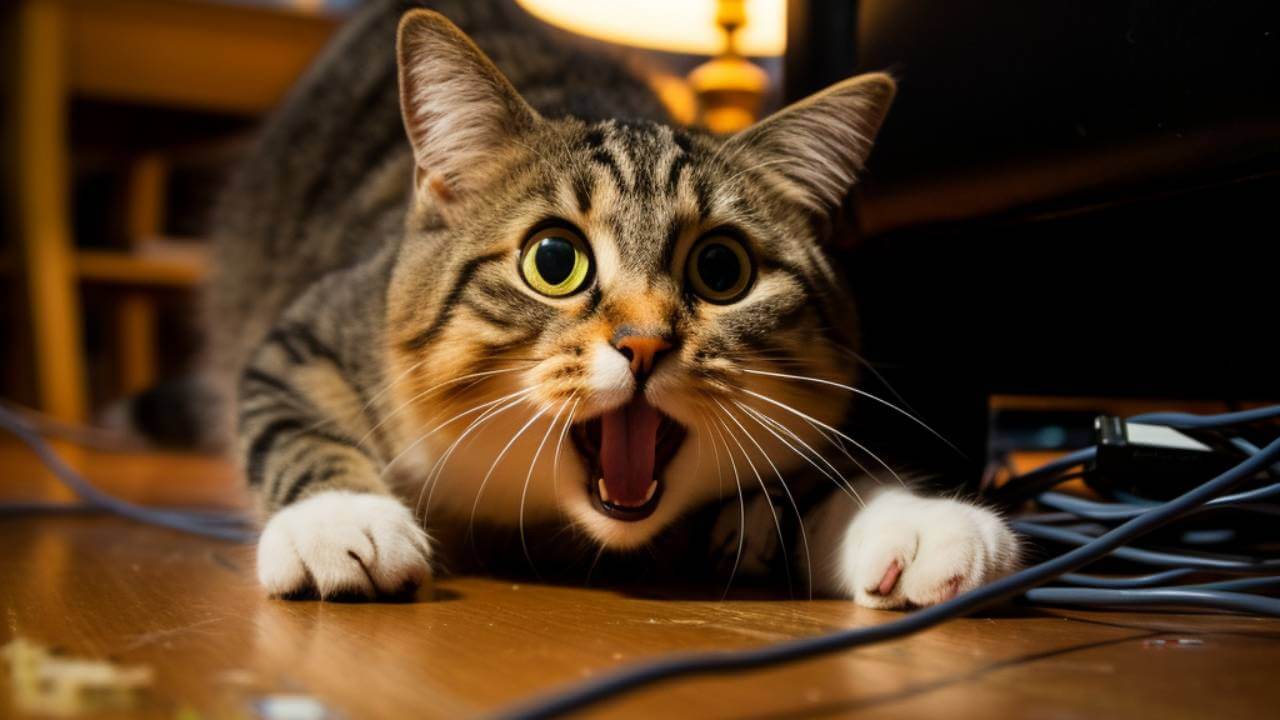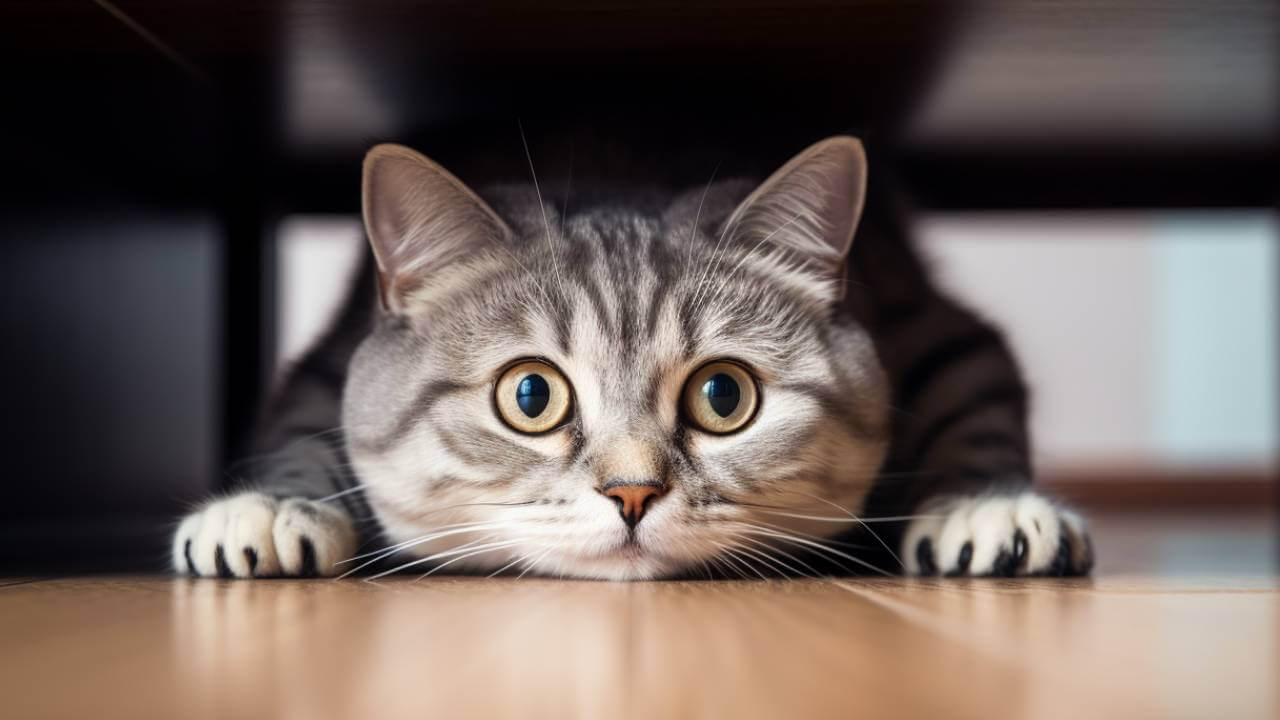When your cat suddenly becomes scared of everything, cat owners start scratching their heads due to puzzling cat behavior. If you’ve ever witnessed your once-confident cat cringing at the slightest noise or retreating from familiar spaces, you’re not alone in your confusion.
We’ll uncover the secrets behind this behavior, explore the underlying causes of sudden fear, and equip you with insights to support your cat through these perplexing moments.
Understanding the Sudden Fear in Cats
Cats are a symphony of emotions, playing notes that range from curiosity to caution, affection to anxiety. Navigating the labyrinth of feline emotions is crucial to comprehending why a cat might suddenly become scared of everything.
Cats may not wear their emotions on their whiskers; their behaviors offer glimpses into their emotional states.
Tail position, ear orientation, vocalizations, and body language are just ways cats communicate their feelings to us. A flicking tail might signify irritation while purring can indicate contentment.
The Dichotomy of the Confident Cat
Cats are renowned for their confident demeanor. They’ll strut through their territory with the air of a monarch, exuding an aura of self-assuredness. Yet, this confidence doesn’t make them impervious to moments of vulnerability.
Cats’ confident exterior often conceals their innate sensitivity, which can endear and perplex their human companions.
A Cat’s Fear Threshold
Unlike humans, who can often pinpoint the source of their fears, cats might react with sudden fear to triggers that seem insignificant to us. A rustling curtain, the sudden clang of a dish, or the distant rumble of thunder can breach a cat’s fear threshold and trigger a response that leaves us bewildered.
Their acute senses, from heightened hearing to keen night vision, allow them to pick up on stimuli that might be imperceptible to us. This heightened awareness can contribute to their sudden fear reactions, as unfamiliar sounds, shadows, and door movements jar their finely tuned senses.

The Causes Of The Sudden Fear in Your Cat
Let’s unearth the diverse factors that contribute to our feline companions’ anxieties, and a clearer picture will guide us toward helping them navigate their world with reassurance and understanding. Imagine being thrust into a pitch-black room where every sound is magnified. Cats, creatures of habit, can experience a similar sense of disorientation when faced with unfamiliar surroundings.
1. Fear of the unknown, often exacerbated by dim lighting or shadows, can lead to sudden fear reactions. A seemingly ordinary object or corner can transform into a source of terror, triggering a rapid retreat or heightened alertness.
2. Sensitivity to sounds. Cats’ auditory prowess is legendary. Their keen sense of hearing allows them to detect subtle rustles, distant footsteps, and the faintest sounds. While this sensitivity serves them well in the wild, it can contribute to sudden fear indoors.
A sudden noise, like a slammed door or thunderclap, can startle them beyond measure, prompting them to flee for safety.
3. Changes in routine. Cats thrive on predictability. Sudden disruption to their well-established routine by a new family member, rearranged furniture, or shifts in mealtime can be unsettling. Cats might respond with caution or avoidance when the familiar script is altered. Their once-stable world feels shaky, and their sudden fear could be a manifestation of this disarray.
4. Underlying health issues. A cat’s behavior can be a window into their health. Physical discomfort, pain, or underlying medical conditions can express themselves through behavioral changes, including sudden fear. When investigating the causes of sudden fear, it’s crucial to rule out any medical issues that might contribute to their unease.
5. Traumatic experience. Cats have a long memory, and a traumatic experience can cast a long shadow. After encountering a hostile animal, experiencing a loud and startling event, or facing a sudden, unexpected threat, cats can be haunted by the memories of such events.
This emotional baggage can lead to impulsive fear reactions triggered by stimuli that remind them of past trauma.

6. Lack of socialization. Kittens need positive social experiences to develop into well-adjusted adult cats. If cats weren’t adequately socialized during their early life, they might develop an aversion to unfamiliar people, animals, or environments.
The fear of the unfamiliar can lead to sudden fear reactions, as situations they haven’t encountered before trigger anxiety.
7. Negative encounters: Cats are territorial creatures and negative interactions with other cats or animals can leave a lasting impact. An aggressive encounter, whether from a neighborhood cat or a stray, can instill fear in your feline friend. The mere scent of a rival can trigger sudden fear reactions, leading to defensive behaviors and heightened alertness.
8. New Additions to the Household. Cats thrive on stability, and introducing a new pet or family member can disrupt their sense of security. A sudden shift in their social dynamics can lead to territorial conflicts and the fear of the unfamiliar. Your cat might become scared of the new pet or person, resulting in sudden fear reactions.
Additionally, cats are remarkably attuned to human emotions and energy. If a household experiences stress, tension, or heightened emotions, cats can absorb these feelings and react with sudden fear. Their innate sensitivity to shifts in the emotional climate can cause them to exhibit anxious behaviors and fear reactions.
Supporting Your Cat Through Sudden Fear
As compassionate guardians, it’s our responsibility to provide our cats with the support and tools they need to navigate a perplexing emotion like fear.
By understanding the cause of their fears and implementing strategies that cater to their unique sensitivities, we can help ease their discomfort and restore their sense of security.
- Provide a Safe Space: Ensure your cat has access to a quiet, secluded area where it can retreat when scared. This could be a spare room, a closet, or a cat tree.
- Keep a Routine: To help your cat feel secure, maintain a consistent schedule for feeding, play, and interaction.
- Desensitization: Gradually expose your cat to the source of its fear in controlled, mild doses, paired with positive reinforcement like treats or affection.
- Use Calming Aids: Consider using pheromone diffusers, calming collars, soothing music specifically designed for cats or innovative solutions like cat collars with cameras to monitor their behavior and environment when you’re not home.
- Avoid Forcing Interaction: Let your cat come to you for comfort rather than picking it up or forcing closeness, which can increase stress.
A veterinarian can rule out underlying health issues contributing to your cat’s behavior. They can also recommend behavior modification techniques, medications, or therapies to help your cat cope with its fears safely and effectively.
Understanding why your cat suddenly becomes scared is like solving a puzzle. Cats experience a mix of emotions, and their reactions might seem mysterious. But we can better support our furry friends by uncovering what triggers their fear.
The next time your cats exhibit sudden fear, you can pause, breathe, and enter their world, offering a gentle touch, a reassuring word, and a haven in distress.

FAQs
How can I help my cat become more comfortable with new sounds?
To help your cat become more accustomed to new sounds, gradually introduce them to various noises at a low volume, then slowly increase the volume over time. This process, known as desensitization, can reduce their fear response and help them feel more secure in their environment.
Is it normal for a cat to suddenly become scared as they age?
As cats age, they can experience changes in their sensory perceptions and cognitive decline, which may make them more reactive to stimuli they previously ignored. Regular veterinary check-ups can help manage these age-related changes.
How can I differentiate between normal fear and something more serious in my cat?
Normal fear responses are typically brief and resolve quickly once the threat is removed. However, if your cat’s fear is intense, lasts for an extended period, or leads to aggressive or destructive behavior, it might be a sign of a more serious condition like anxiety or phobia. Consulting with a veterinarian or a pet behaviorist is advisable in these cases.
Can changing my cat’s diet impact their anxiety levels?
Feeding your cat a balanced diet formulated for their specific age, health status, and lifestyle, possibly supplemented with calming nutrients like omega-3 fatty acids, may help reduce anxiety.
Additionally, considering cat insurance can help manage the costs of veterinary care for underlying health issues that may contribute to your cat’s anxiety.
What role does play and exercise play in managing my cat’s fears?
Regular play and exercise can significantly alleviate anxiety in cats. Engaging in regular play sessions helps to reduce stress, provides mental stimulation, and builds confidence. Toys that mimic hunting behaviors, like feather wands or laser pointers, can effectively engage them and reduce fear responses.
References:
- Understand why cats might exhibit fearful behavior on the Fear of Cats page.
- Hear from experts on the unique behaviors of cats and why they might suddenly exhibit signs of anxiety in Why Cats Are Freaking Out Behaviour expert speech.
- The common fear triggers in the article: 4 shocking facts about fear.
- The complexities of feline emotions and anxiety are in the Feline Fear and Anxiety government source.






My cat has been acting skittish lately. Thanks for the insights on why cats can suddenly become fearful!